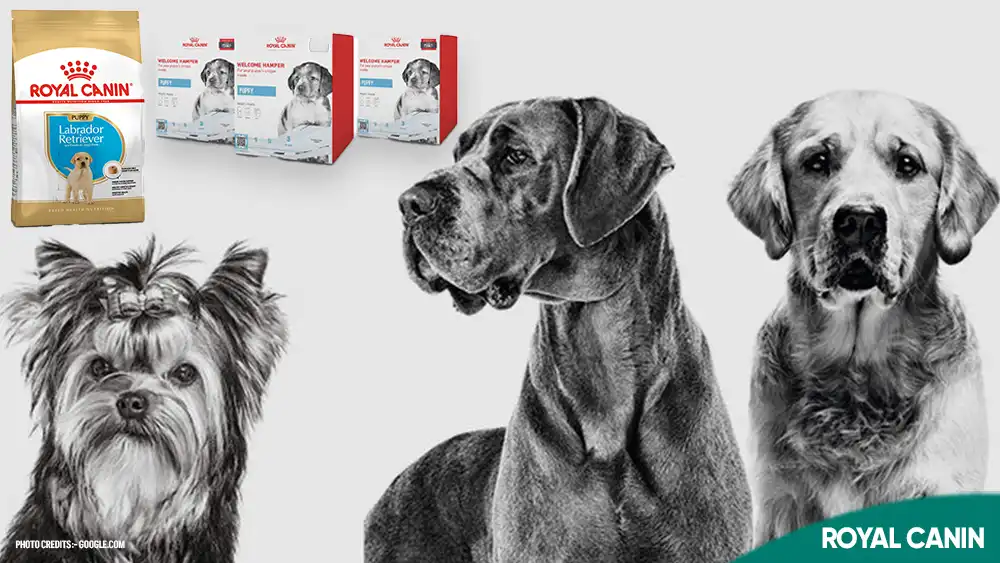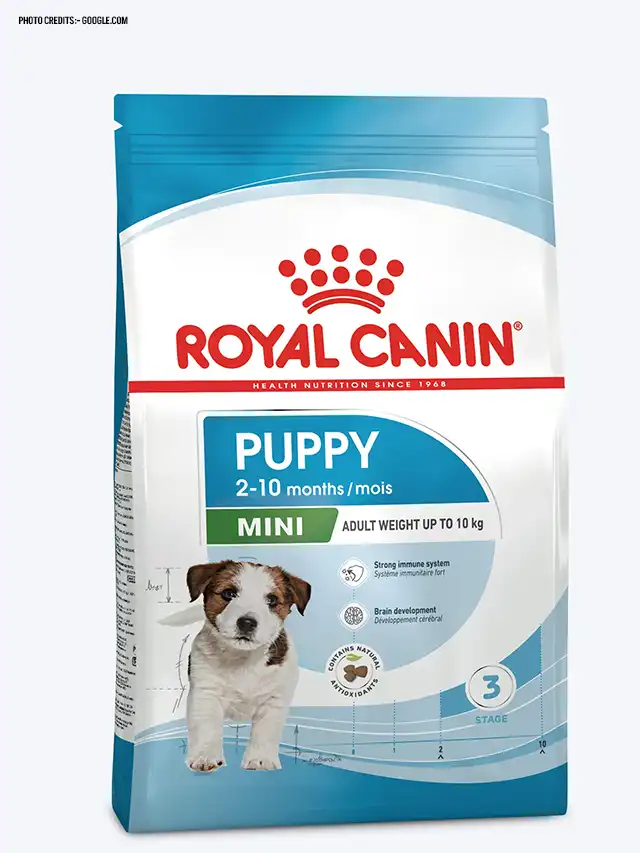
HEALTH BLOG
Is Royal Canin a Good Dog Food?
-
Rahul Priydarss
Wondering Is Royal Canin a good dog food? Discover the answer with our comprehensive guide on Royal Canin’s nutritional offerings. This well-established brand is renowned for its scientifically formulated diets tailored to various breeds, sizes, and health conditions. Learn about its history, ingredient quality, and how its specialized formulas address specific health needs. With a focus on precise nutrition and high-quality standards, Royal Canin is designed to support your dog’s overall well-being. Explore why pet owners and veterinarians often recommend this brand and whether it meets your furry friend’s dietary requirements. Get the insights you need to make an informed choice.
Introduction to Is Royal Canin a Good Dog Food:
Royal Canin is a well-known name in the pet food industry, particularly recognized for its scientifically formulated diets tailored to the specific needs of different breeds, sizes, and life stages of dogs. Established over 50 years ago, the brand has built a reputation for prioritizing pet health through nutrition. However, as with any pet food brand, there are various opinions and considerations when determining if Royal Canin is the right choice for your dog. In this article, we’ll explore the factors that contribute to Royal Canin’s popularity, the quality of its ingredients, and whether it meets the nutritional needs of your furry friend.
What is Royal Canin?:
Royal Canin is a premium pet food brand specializing in creating scientifically formulated diets for dogs and cats. Founded in 1968 by a French veterinarian, the brand has grown to become a global leader in pet nutrition, known for its commitment to health-focused, breed-specific, and life-stage-specific formulas. Royal Canin offers a wide range of products designed to meet the unique dietary needs of pets, from puppies and kittens to senior animals and those with specific health conditions. The brand’s approach is centered on research and innovation, ensuring that each product supports optimal health and well-being for pets.

Table of Contents
Importance of Choosing the Right Dog Food:
Selecting the right dog food is crucial for your pet’s overall health, longevity, and quality of life. Just like humans, dogs require a balanced diet rich in essential nutrients to support their physical and mental well-being. The right dog food provides the necessary proteins, fats, vitamins, and minerals that fuel growth, maintain a healthy coat, support digestion, and strengthen the immune system. Furthermore, a diet tailored to your dog’s specific age, breed, size, and health conditions can help prevent obesity, allergies, and other common health issues. By choosing the appropriate food, you ensure that your dog gets the right nutrition to thrive and enjoy a happy, active life.
History and Origin of Royal Canin:
Royal Canin was founded in 1968 by Jean Cathary, a French veterinarian who was driven by a passion to improve the health and nutrition of pets through scientifically formulated diets. After noticing the connection between poor diets and health issues in pets, Dr. Cathary began experimenting with recipes that combined balanced nutrients to address specific health concerns. This led to the creation of the first Royal Canin product, a cereal-based dry food that quickly gained popularity among pet owners.
In 1972, Royal Canin was acquired by the Guyomarc’h Group, which helped expand the brand’s reach beyond France. Throughout the 1970s and 1980s, Royal Canin continued to innovate, introducing breed-specific and life-stage-specific formulas, and setting new standards in pet nutrition.
By the 1990s, Royal Canin had established itself as a leader in the global pet food market, known for its commitment to research and development. In 2001, the company was acquired by Mars, Inc., further enhancing its resources and global presence. Today, Royal Canin is recognized worldwide for its tailored nutritional solutions that cater to the unique needs of dogs and cats, with a focus on promoting health and well-being through precise nutrition.
Nutritional Value of Royal Canin Dog Food:
Royal Canin dog food is designed to provide a balanced and comprehensive diet tailored to the specific needs of dogs based on their breed, size, age, and health conditions. The brand’s formulas are meticulously crafted with a focus on delivering essential nutrients that support overall health and well-being.
Proteins: Royal Canin emphasizes high-quality protein sources to support muscle development and maintenance. The protein content is adjusted according to the specific needs of the dog, ensuring optimal levels for growth, energy, and recovery.
Fats: The inclusion of healthy fats, such as omega-3 and omega-6 fatty acids, supports skin and coat health, as well as cognitive function. Fats also provide a concentrated source of energy, particularly for active dogs.
Carbohydrates: Royal Canin dog food includes easily digestible carbohydrates that provide a steady energy source. These carbohydrates also aid in maintaining digestive health and managing blood sugar levels.
Vitamins and Minerals: Each formula is enriched with essential vitamins and minerals that contribute to immune system support, bone health, and overall vitality. Specific nutrients like calcium, phosphorus, and vitamins A and D are carefully balanced to meet the dietary needs of different life stages and breeds.
Fiber: The dietary fiber content in Royal Canin dog food promotes healthy digestion and aids in maintaining optimal weight. It also helps in managing issues like constipation and diarrhea.
Specialized Ingredients: Royal Canin often includes additional ingredients tailored to address specific health concerns, such as joint health, dental care, and urinary health. These specialized components ensure that each formula not only nourishes but also supports targeted health outcomes.
Is Royal Canin a Good Dog Food?:
Royal Canin is widely regarded as a reputable dog food brand, known for its commitment to producing nutritionally balanced diets tailored to the specific needs of various dog breeds, sizes, and life stages. The brand’s emphasis on science-based nutrition is a significant factor in its popularity, as Royal Canin often works closely with veterinarians and pet nutritionists to develop their formulas. This collaboration ensures that their products are designed to support the overall health and well-being of dogs, providing essential nutrients in the right proportions.
However, there are some considerations to keep in mind. Royal Canin products tend to be more expensive than other dog food brands, which may be a factor for budget-conscious pet owners. Additionally, some of their formulas include animal by-products, which can be a point of concern for those who prefer dog foods with more natural or whole ingredients. Despite these aspects, Royal Canin’s commitment to research and development, along with its wide variety of options including dry kibble, wet food, and prescription diets, make it a solid choice for many dog owners.
Why Does the Royal Canin Need a Prescription:
Certain Royal Canin dog food formulas require a prescription because they are designed to address specific health issues or medical conditions that necessitate veterinary oversight. These prescription diets are formulated with precise nutrient profiles and ingredients tailored to support the management of particular health problems, and their use should be guided by a veterinarian to ensure they meet the pet’s individual needs. Here’s why a prescription might be necessary:
Specialized Formulations: Prescription diets from Royal Canin are developed to manage complex health conditions such as renal disease, diabetes, gastrointestinal disorders, and allergies. These formulations contain specialized nutrients and ingredients that can influence a pet’s health, and their use must be monitored to avoid potential adverse effects or interactions with other treatments.
Veterinary Supervision: Prescription diets require a veterinarian’s guidance to ensure that the chosen formula is appropriate for the pet’s specific health condition. A vet can assess the pet’s overall health, diagnose the condition, and determine the most suitable diet. This supervision helps to optimize the treatment plan and ensure that the diet complements other aspects of the pet’s care.
Medical Monitoring: For pets with chronic or severe health conditions, ongoing monitoring and adjustment of the diet may be necessary. A veterinarian can track the pet’s progress, make adjustments to the diet if needed, and provide guidance on how to best integrate the prescription food into the pet’s overall treatment regimen.
Preventing Misuse: By requiring a prescription, Royal Canin helps to prevent misuse or over-reliance on specialized diets that may not be suitable for all pets. This ensures that the diet is used appropriately and that it is part of a comprehensive health management plan designed by a professional.
Compliance with Regulations: Prescription diets often fall under regulatory guidelines that require veterinary oversight to ensure they are used safely and effectively. These guidelines help to ensure that the diets are used in accordance with their intended purpose and that they are beneficial for the pet’s specific medical needs.
Variety of Products Offered by Royal Canin:
Royal Canin offers a wide range of ddog food products designed to meet the specific needs of dogs based on factors like breed, size, age, and health conditions. Their product line is divided into several categories, each tailored to address particular nutritional requirements.
Breed-Specific Formulas: Royal Canin is renowned for its breed-specific dog food, which is customized to cater to the unique characteristics and needs of individual breeds. These formulas consider factors like jaw shape, common health concerns, and activity levels. Examples include Royal Canin Bulldog, Royal Canin German Shepherd, and Royal Canin Labrador Retriever.
Size-Specific Formulas: These products are tailored to the needs of dogs based on their size, whether they are small, medium, large, or giant breeds. Each formula considers the energy levels, life expectancy, and common health issues associated with the dog’s size. Examples include Royal Canin Mini, Royal Canin Medium, Royal Canin Maxi, and Royal Canin Giant.
Life Stage Formulas: Royal Canin offers specialized diets for different life stages, ensuring that dogs receive the appropriate nutrition as they age. These include puppy, adult, and senior formulas, each designed to support growth, maintenance, or aging. Examples include Royal Canin Puppy, Royal Canin Adult, and Royal Canin Senior.
Health-Specific Formulas: These therapeutic diets are formulated to address specific health conditions and are often recommended by veterinarians. They include options for dogs with sensitivities, allergies, digestive issues, joint problems, and more. Examples include Royal Canin Hypoallergenic, Royal Canin Gastrointestinal, and Royal Canin Renal Support.
Weight Management Formulas: Royal Canin offers products designed to help manage a dog’s weight, supporting both weight loss and maintenance. These formulas are lower in calories while still providing balanced nutrition. Examples include Royal Canin Satiety Support and Royal Canin Weight Control.
Specialized Nutrition Formulas: These products cater to dogs with specific nutritional needs, such as high-energy dogs, working dogs, or dogs with dental issues. They provide targeted support to ensure optimal health and performance. Examples include Royal Canin Sport, Royal Canin Dental Care, and Royal Canin Dermacomfort.
Wet Food and Treats: In addition to dry kibble, Royal Canin offers wet food options that provide hydration and are easier to chew, especially for older dogs or those with dental issues. They also offer a range of treats that align with their nutritional philosophy. Examples include Royal Canin Canine Health Nutrition Wet Food and Royal Canin Treats.
Royal Canin’s Approach to Pet Health:
Royal Canin’s approach to pet health is rooted in the belief that precise nutrition is key to promoting the long-term well-being of dogs and cats. This philosophy is reflected in their scientifically formulated diets, which are tailored to meet the specific needs of pets based on breed, size, age, lifestyle, and health conditions. Here’s how Royal Canin ensures that their approach supports optimal pet health.
Science-Based Nutrition: Royal Canin’s formulas are developed through extensive research and collaboration with veterinarians, nutritionists, and breeders. The brand relies on scientific data to determine the ideal balance of nutrients, ensuring that each product provides the exact nutrients needed to support a pet’s health. Their research focuses on understanding the unique physiological needs of different breeds, life stages, and health conditions, allowing them to create specialized diets that cater to these specific requirements.
Tailored Nutrition: Recognizing that no two pets are the same, Royal Canin creates customized diets for different breeds, sizes, and life stages. This tailored approach ensures that each pet receives the right balance of nutrients for their unique needs, whether they require a diet for growth, maintenance, or managing health issues. The brand also offers therapeutic diets designed to support pets with specific health concerns, such as digestive problems, renal issues, or allergies. These diets are often recommended by veterinarians as part of a comprehensive health plan.
Focus on Preventative Health: Royal Canin’s nutrition philosophy emphasizes preventative care. By providing pets with the right nutrients in the correct proportions, their diets help prevent common health issues such as obesity, joint problems, and dental disease. Their formulas are designed to support overall health and well-being, including promoting healthy digestion, maintaining a shiny coat, and supporting a strong immune system.
Quality and Safety: Royal Canin is committed to producing high-quality, safe products. They adhere to stringent quality control standards throughout the manufacturing process, from sourcing raw ingredients to packaging the final product. The brand uses only high-quality ingredients that meet their strict nutritional standards, and each batch of food undergoes rigorous testing to ensure safety and consistency.
Education and Collaboration: Royal Canin works closely with veterinarians, breeders, and pet owners to ensure that their products meet the needs of pets. They also invest in education, providing resources and training for pet owners and professionals to better understand pet nutrition and health. Their commitment to collaboration ensures that they stay at the forefront of pet health innovation, continuously improving their formulas based on the latest scientific findings.
Global Research and Development: Royal Canin operates research centers around the world, where they study the nutritional needs of pets and develop new products. This global approach allows them to consider the diverse needs of pets in different regions, ensuring that their products are relevant and effective worldwide. The brand’s ongoing investment in research and development enables them to stay ahead in the field of pet nutrition, constantly refining their approach to better support pet health.
Ingredients Used in Royal Canin Dog Food:
Royal Canin dog food is formulated with a variety of high-quality ingredients designed to meet the specific nutritional needs of dogs. The brand emphasizes the use of carefully selected components to provide balanced nutrition and support overall health. Here’s an overview of the key ingredients commonly found in Royal Canin dog food.
Here’s a table format summarizing the typical ingredients used in Royal Canin dog food and their quantities:
| Ingredient | Description | Quantity (Approximate) |
|---|---|---|
| Animal Proteins | High-quality sources like chicken, beef, and fish. | 20-30% of total formula |
| Vegetable Proteins | Plant-based proteins like pea protein. | 5-10% of total formula |
| Animal Fats | Sources such as chicken fat or fish oil. | 10-15% of total formula |
| Vegetable Oils | Oils such as canola oil or flaxseed oil. | 5-10% of total formula |
| Rice | Easily digestible carbohydrate source. | 20-30% of total formula |
| Corn and Wheat | Carbohydrate sources for energy. | 10-20% of total formula |
| Beet Pulp | Provides dietary fiber for digestive health. | 5-7% of total formula |
| Cellulose | Source of dietary fiber. | 1-3% of total formula |
| Vitamins | Essential vitamins A, D, E, and B-complex. | Trace amounts (0.1-1%) |
| Minerals | Key minerals like calcium, phosphorus, potassium, and magnesium. | Trace amounts (0.1-1%) |
| Probiotics and Prebiotics | Supports gut health and digestive balance. | 0.1-1% of total formula |
| Antioxidants | Components like vitamin E and vitamin C. | Trace amounts (0.1-1%) |
| Omega Fatty Acids | Fish oil and other sources of omega-3 and omega-6. | 1-2% of total formula |
| Glucosamine and Chondroitin | Supports joint health and mobility. | 0.1-1% of total formula |
| Natural Flavors | Enhances palatability for pets. | Trace amounts (0.1-1%) |
- Please note that these quantities are approximate and can vary depending on the specific Royal Canin formula and the nutritional needs it is designed to address.

Quality Control and Safety Standards at Royal Canin:
Royal Canin places a strong emphasis on quality control and safety to ensure that their pet food products meet high standards of nutrition and safety. The brand’s approach to quality control encompasses several key practices.
Rigorous Ingredient Selection: Royal Canin sources ingredients from reputable suppliers and conducts thorough quality checks to ensure they meet the company’s standards. Ingredients are evaluated for their nutritional value, safety, and consistency before being used in production.
Stringent Manufacturing Processes: The manufacturing facilities adhere to strict protocols to maintain high standards of hygiene and safety. Royal Canin’s production processes are designed to prevent contamination and ensure that each batch of food is produced under controlled conditions. Advanced technologies and equipment are used to precisely measure and mix ingredients, ensuring consistency in each product.
Quality Assurance Testing: Each batch of Royal Canin dog food undergoes comprehensive quality assurance testing. This includes checking for nutrient content, safety, and quality to ensure that the food meets the specifications outlined in the product formulation. The brand performs tests for contaminants such as pathogens, toxins, and heavy metals to ensure the safety of the food.
Research and Development: Royal Canin invests in research and development to continually improve their formulations and manufacturing processes. Their research centers focus on understanding the nutritional needs of pets and developing innovative solutions to meet those needs. The R&D process involves collaboration with veterinarians, nutritionists, and pet health experts to refine and enhance product formulations.
Compliance with Regulations: Royal Canin adheres to both national and international regulations regarding pet food safety and quality. This includes compliance with guidelines set by organizations such as the Association of American Feed Control Officials (AAFCO) and the European Pet Food Industry Federation (FEDIAF). The brand also ensures that their products meet local regulatory requirements in the regions where they are sold.
Traceability and Transparency: Royal Canin maintains a high level of traceability throughout the supply chain. This allows them to track ingredients from their origin to the final product, ensuring transparency and accountability. In the event of any issues, Royal Canin has protocols in place for product recalls and communication with consumers to address any concerns.
Veterinary Collaboration: Royal Canin collaborates with veterinarians to ensure that their products are aligned with current veterinary knowledge and practices. This collaboration helps to address specific health concerns and provide solutions that are both effective and safe for pets.
Comparing Royal Canin to Other Dog Food Brands:
When comparing Royal Canin to other dog food brands, several key factors come into play, including ingredient quality, formulation focus, price, and brand reputation. Here’s a breakdown of how Royal Canin stacks up against other popular dog food brands.
1. Ingredient Quality:
Royal Canin: Offers a broad range of breed-specific, size-specific, and life-stage-specific formulas. Includes specialized diets for various health conditions, such as allergies, joint issues, and digestive problems. Tailors nutrition based on extensive research and collaboration with veterinary professionals.
Other Brands:
Blue Buffalo: Provides breed-specific and health-focused options, including formulas for weight management, allergies, and digestive health.
Wellness: Offers a variety of formulas aimed at general health, including options for grain-free and high-protein diets.
Hill’s Science Diet: Focuses on clinically proven nutrition for specific health concerns and life stages, with a strong emphasis on scientific research.
3. Price:
Royal Canin: Generally positioned in the premium price range, reflecting the brand’s focus on specialized, research-driven nutrition and high-quality ingredients. Prices can vary depending on the specific formula and packaging size.
Other Brands:
Blue Buffalo: Also falls into the premium price range, with a focus on natural ingredients and high meat content.
Wellness: Offers products across a range of prices, from premium to mid-range, depending on the specific formula.
Hill’s Science Diet: Priced similarly to Royal Canin, often positioned as a premium option due to its science-backed formulations.
Customer Reviews and Feedback on Royal Canin Dog Food:
Royal Canin dog food generally garners positive feedback from customers, particularly for its breed-specific and health-focused formulations. Pet owners frequently appreciate the brand’s attention to the unique nutritional needs of various dog breeds, noting improvements in coat condition, energy levels, and overall health. The health-focused diets are often praised for their effectiveness in addressing specific issues such as allergies, digestive problems, and joint health, with many reporting noticeable benefits in their pets’ well-being.
Additionally, Royal Canin’s food is well-regarded for its palatability, as many dogs consume it eagerly, suggesting that it is both appealing and satisfying. The quality of ingredients used in Royal Canin products is another point of praise, with customers valuing the high-quality animal proteins and beneficial additives included in the formulas.
FAQs about Is Royal Canin a Good Dog Food?:
A1: Yes, Royal Canin offers hypoallergenic and limited-ingredient diets designed to help dogs with allergies.
A2: Royal Canin uses meat meals, which are concentrated forms of meat, as a primary protein source in many of their formulas.
A3: For many pet owners, the tailored nutrition and quality of Royal Canin justify the higher price.
A4: While most dogs tolerate Royal Canin well, some may experience digestive issues, particularly if they have sensitivities to certain ingredients.
A5: Consult with your veterinarian to determine the best Royal Canin formula based on your dog’s breed, age, and health condition.

-Please remember, to always consult with healthcare professionals or Doctors for personalised advice related to medical conditions.
Conclusion:
In conclusion, Is Royal Canin a good dog food? Yes, Royal Canin is widely recognized for its commitment to providing high-quality, scientifically formulated diets tailored to specific breeds, sizes, and health needs. The brand’s focus on precise nutrition and thorough research ensures that its formulas support various aspects of canine health, from coat condition to digestive well-being. Royal Canin’s range of breed-specific and health-focused products, backed by rigorous quality control and safety standards, often results in positive feedback from pet owners. While the premium price may be a consideration, many find the specialized nutrition and overall effectiveness justify the investment. Therefore, Royal Canin is generally considered a good choice for those seeking targeted nutritional support for their dogs.




